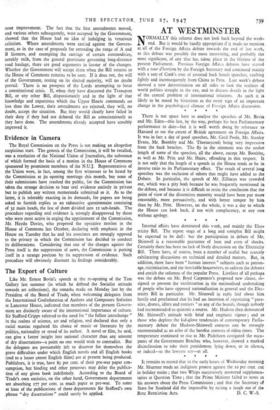Evidence in Camera
The Royal Commission on the Press is not making an altogether auspicious start. The genesis of the Commission, it will be recalled, was a resolution of the National Union of Journalists, the substance of which formed the basis of a motion in the House of Commons sponsored by prominent members of the N.U.J. Representatives of the Union were, in fact, among the first wimesses to be heard by the Commission at its opening meetings this month, but none of their submissions have reached the public, for the Commission has taken the strange decision to hear oral evidence entirely in private but to publish any written memoranda submitted to it. As to the latter, it is tolerably exacting in its demands, for papers are being asked to furnish replies to an exhaustive questionnaire consisting of 32 main heads, the last of them divided into 12 sub-heads. The procedure regarding oral evidence is strongly disapproved by those who were most active in urging the appointment of the Commission, Mr. Haydn Davies, who proposed the operative motion in the House of Commons last October, declaring with emphasis in the House on Tuesday that he and his associates are strongly opposed to the privacy in which the Commission has decided to conduct its deliberations. Considering that one of the charges against the Press itself is the suppression of news, the Commission is putting itself in a strange position by its suppression of evidence. Such procedure will obviously discount its findings considerably.


































 Previous page
Previous page